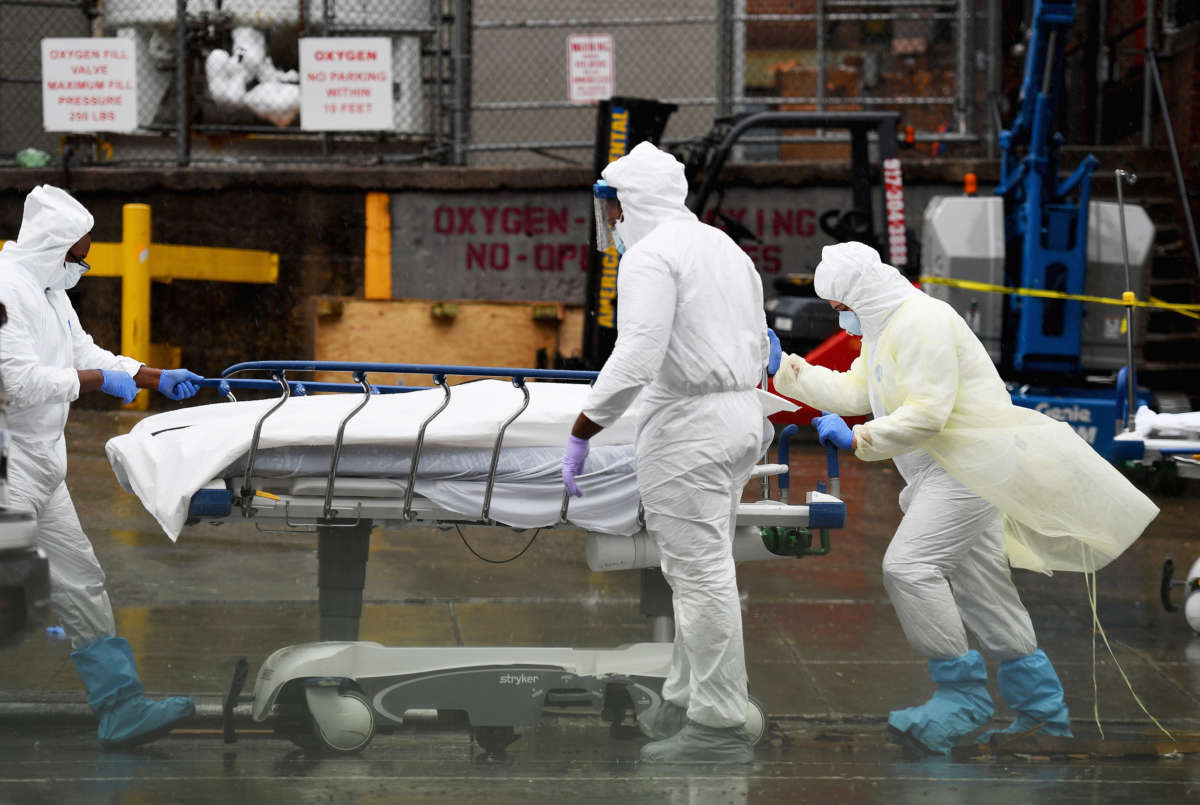Part of the Series
Despair and Disparity: The Uneven Burdens of COVID-19
Two epidemiologists, writing an op-ed together in The New York Times on Wednesday, are suggesting that earlier efforts to mitigate the spread of the novel coronavirus — even implementing social distancing measures by just a week or two — could have saved tens of thousands of American lives.
Britta Jewell, a research fellow in the department of infectious disease epidemiology at Imperial College, London, and Nicholas Jewell, chair of biostatistics and epidemiology at London School of Hygiene and Tropical Medicine (and also a professor at the University of California, Berkeley), wrote in their opinion piece that earlier action could have been beneficial.
Tactics for dealing with COVID-19 and other diseases where there isn’t an effective treatment, much less a vaccine to prevent their spread, require intervention methods that “go back to the basics,” the researchers wrote, noting that social distancing measures (like limiting large gathering sizes or closing schools) must be implemented in those cases.
The researchers noted that the White House didn’t take such actions until March 16, three days after a national emergency on COVID-19 was declared. In its advisory message, the Trump administration told Americans to avoid groups of more than 10 people, stop all unnecessary travel or visits to friends’ or relatives’ homes and avoid restaurants or bars; it also urged all states to close schools within their jurisdictions.
Even with the advisory in place, the White House did not order any state or municipality to quarantine or make a blanket stay-in-place proclamation for the nation at large. A few days later, California became the first state to issue such an order, followed by 14 other states over the next five days.
Both authors stated that their research models suggest, had the Trump administration acted earlier in deeming social distancing measures necessary to prevent the spread of COVID-19, thousands of lives could have been saved.
Current models forecast over 60,000 Americans may die from COVID-19 by August. Had social distancing measures been pushed by Trump a week prior, however, the researchers concluded that the number could have been just 23,000 — nearly a 60 percent drop in current death estimates. A decision to implement those measures two weeks earlier than when the president’s recommendations were made would have dropped estimates down by 90 percent.
Noting that modeling estimates aren’t always a “crystal ball,” and that their numbers could be off, the researchers maintain that “What matters more is the relative effect of moving earlier rather than later in trying to contain the spread.”
In other words, had the Trump administration taken things more seriously, the number of Americans who are likely to die from the disease could be starkly smaller.
“Whatever the final death toll is in the United States, the cost of waiting will be enormous, a tragic consequence of the exponential spread of the virus early in the epidemic,” they added in their op-ed piece.
Indeed, the week or so prior to Trump issuing his social distancing recommendations, the president was making a number of statements suggesting he didn’t see the crisis as being all that important or that such actions were warranted. On March 9, for example, Trump sent out a tweet in which he expressed a desire to resist calls for distancing measures, comparing such actions as being out of line for what we do during flu season each year, and thus unnecessary for COVID-19.
“Nothing is shut down, life & the economy go on” when flu season occurs, Trump pointed out.
Also on March 9, Trump sent out a separate tweet to his followers insinuating that fears about coronavirus were nothing more than mere partisan statements against him.
“The Fake News Media and their partner, the Democrat Party, is doing everything within its semi-considerable power (it used to be greater!) to inflame the CoronaVirus situation, far beyond what the facts would warrant,” Trump said, citing the words of Surgeon General Jerome Adams that week, who said, “The risk is low to the average American.”
Join us in defending the truth before it’s too late
The future of independent journalism is uncertain, and the consequences of losing it are too grave to ignore. To ensure Truthout remains safe, strong, and free, we need to raise $29,000 in the next 36 hours. Every dollar raised goes directly toward the costs of producing news you can trust.
Please give what you can — because by supporting us with a tax-deductible donation, you’re not just preserving a source of news, you’re helping to safeguard what’s left of our democracy.
